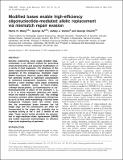Modified bases enable high-efficiency oligonucleotide-mediated allelic replacement via mismatch repair evasion
Author(s)
Wang, Harris H.; Vonner, Ashley J.; Church, George M.; Xu, George Jing; Church, George M.
DownloadWang-2011-Modified bases enable high-efficiency.pdf (5.864Mb)
PUBLISHER_CC
Publisher with Creative Commons License
Creative Commons Attribution
Terms of use
Metadata
Show full item recordAbstract
Genome engineering using single-stranded oligonucleotides is an efficient method for generating small chromosomal and episomal modifications in a variety of host organisms. The efficiency of this allelic replacement strategy is highly dependent on avoidance of the endogenous mismatch repair (MMR) machinery. However, global MMR inactivation generally results in significant accumulation of undesired background mutations. Here, we present a novel strategy using oligos containing chemically modified bases (2′-Fluoro-Uridine, 5-Methyl-deoxyCytidine, 2,6-Diaminopurine or Iso-deoxyGuanosine) in place of the standard T, C, A or G to avoid mismatch detection and repair, which we tested in Escherichia coli. This strategy increases transient allelic-replacement efficiencies by up to 20-fold, while maintaining a 100-fold lower background mutation level. We further show that the mismatched bases between the full length oligo and the chromosome are often not incorporated at the target site, probably due to nuclease activity at the 5′ and 3′ termini of the oligo. These results further elucidate the mechanism of oligo-mediated allelic replacement (OMAR) and enable improved methodologies for efficient, large-scale engineering of genomes.
Date issued
2011-05Department
Harvard University--MIT Division of Health Sciences and TechnologyJournal
Nucleic Acids Research
Publisher
Oxford University Press (OUP)
Citation
Wang, H. H. et al. “Modified Bases Enable High-efficiency Oligonucleotide-mediated Allelic Replacement via Mismatch Repair Evasion.” Nucleic Acids Research 39.16 (2011): 7336–7347. Web. 1 June 2012.
Version: Final published version
ISSN
0305-1048
1362-4962